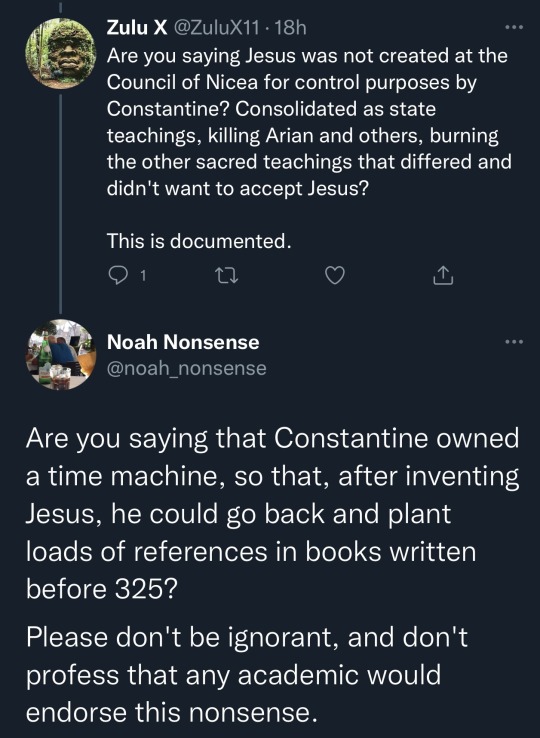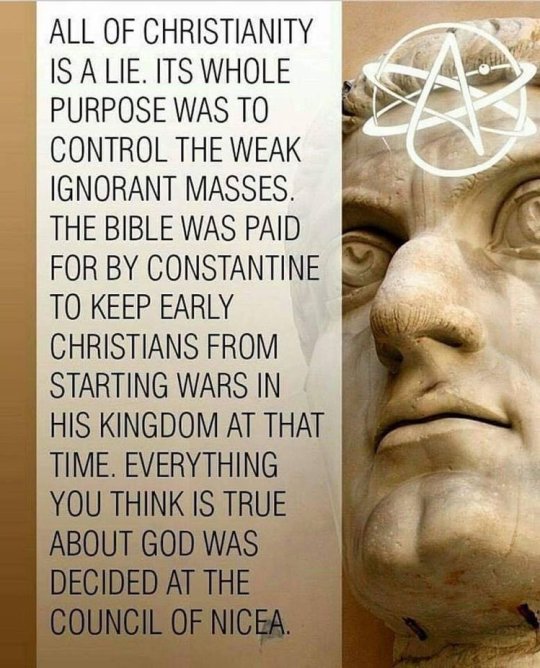#Council of Nicea
Note
i've read that mormons and JWs are considered heretics because they don't affirm the trinity, so i was wondering what the sort-of 'cut off' point is. like would the ACOE be considered heretics because they say mary isn't the mother of God, only the mother of christ, for example
Alrighty, this is a big one. So, as far as the Jehovah's Witnesses and the (mainstream) Latter Day Saints movement go, things are.... a little more complicated in terms of whether their doctrine is "heresy" or if they are just plain non-Christian (and thus wouldn't count as heretical).
The crux of the argument that they are not Christian is that they do not affirm the Nicene Creed, which was articulated during the Councils of Nicaea (325 AD) and Constantinople (381 AD). While Mormons and JWs can affirm the most primitive of Christian creeds ("Christ is Lord"), the Nicene Creed very quickly took on the status of the σύμβολον, or symbolum in Latin; the "symbol of faith," the creed whose affirmation is itself a verification of one's Christian identity. That's why during the Council of Trent, for example, the Tridentine Fathers invited Protestants to participate in the Council on the condition that they could still affirm the Creed.
Of course, Mormons and JWs do not see it that way. They self-identify as Christians; and each group doesn't see themselves just as Christians, but as restorers of a purer, more original Christianity that had existed before the creation of that Creed.
But, anyway, if the conclusion of this argument is accepted, and members of the (mainstream) Latter Day Saints movement and Jehovah's Witnesses are not considered Christian, they by definition cannot be considered heretics; per the Baltimore Catechism, heretics are "baptized Christians, but do not believe all the articles of faith" (Q 1170).
The Assyrian Church of the East affirms the Nicene Creed, have Apostolic Succession, and have limited intercommunion with the Catholic Church. And, Christologically, they have an interesting situation going on. The Assyrian Church has not formally accepted the dogmatic Christological definitions of the Council of Ephesus (431). And, on that alone, the ACoE would seem to fit into the Baltimore Catechism's definition of heretic.
But over 1550 years after that split, the leaders of both the Assyrian Church of the East and the Catholic Church signed a document that affirmed that both Churches saw the other's Christological doctrines as valid, and that both theologies were expressions of the same Apostolic faith. You can read the full document, which is not very long, here.
But to abstract the discussion of heresy for a moment (bold of me to do, admittedly, after saying the last ask was a little vague); we need to make a distinction between formal heresy and material heresy. As Pope Benedict noted in 1993, which itself was an echo of the 1912 Catholic Encyclopedia's description of heresy, the defining characteristic of formal heresy is pertinacia, which can be translated as "stubbornness." What makes a person a "heretic" in a condemnable sense is this pertinacia, this holding fast to falsehoods in defiance of correction by proper authority.
So while the first generations of Protestants may be considered formal heretics, Pope Benedict noted that this does not reflect the actual social and religious conditions of Protestants living today, who are simply living out their Christian faith in the traditions that have arisen since the Reformation. They may be material heretics, and the doctrines of Protestantism may be considered heretical from the Catholic viewpoint, but being a Protestant does not automatically incur the guilt of heresy.
And, in all honesty, most Christians alive today (and most Christians in all ages) have in all probability been material heretics - i.e., they hold some wrong or incorrect opinions concerning the faith, but simply out of ignorance and not in defiance of proper authority. And that is not a sin.
#asks#Christianity#Catholicism#Mormon#heresy#Jehovah's Witnesses#Assyrian Church of the East#catechism#Pope Benedict#Pope John Paul II#Council of Nicea#Nicene Creed#authority#Mar Dinkhia IV#Council of Trent#Protestant Reformation#Council of Ephesus
17 notes
·
View notes
Note
Correct me if I’m wrong but don’t mormons not follow the nicene creed
I am not an expert on Mormonism. But no, they don’t.
12 notes
·
View notes
Text
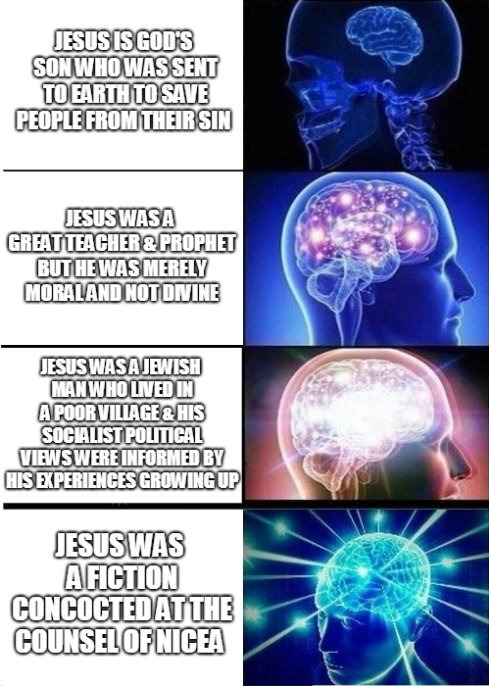
Based on this fabulous video
#mine#memes i forgot i made#memes#expanding brain meme#i am truly brilliant sometimes i'm glad i found this again#religion cw#theology#christianity#jesus christ#council of nicea#reposting everything from my twitter feed#i'm about to delete everything so get it while it's hot#tweet: 2019
3 notes
·
View notes
Text
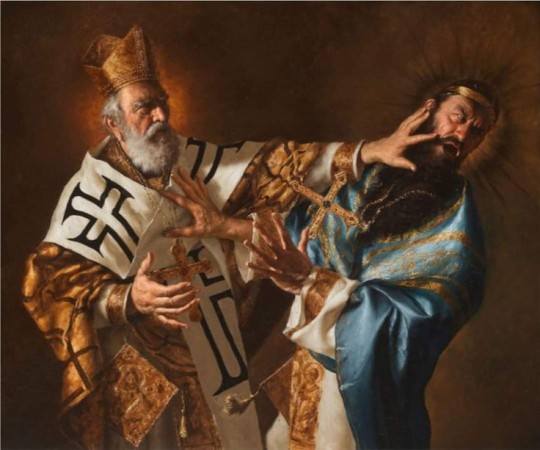
A modern Traditional Catholic image of St. Nicholas of Myra giving the heretic Arius what all heretics deserve at the Council of Nicea. Arius started the Arian heresy. The legend of Santa Claus is based on him. And you thought coal in your stocking was bad? 😏
#traditional catholicism#traditional catholic images#traditional catholic modern art#traditional catholic saints#traditional catholic saints images#st. nicholas of myra#traditional catholic history#punches the heretic arius#council of nicea#the arian heresy
3 notes
·
View notes
Text
Council of Nicea
The Council of Nicea: Unifying the Belief in Christ’s Divinity — In the early years of Christianity, the Church faced a significant theological dispute that threatened to divide its followers. This dispute centered around the nature of Jesus Christ and his relationship to God the Father. The controversy was primarily due to a doctrine known as Arianism, proposed by Arius of Alexandria, which…

View On WordPress
0 notes
Text
Jesus is Our Sabbath
Thesis: Jesus is our Sabbath... a response to those who insist that only the Sabbath day is only legitimate day for worship. The Ten Commandments in relationship the Sabbath and the New Covenant in relationship to the Covenant of Noah for the Nations.
Reprint from Scholars Corner
Jesus is our Sabbath, our Day of Rest. He is the fulfillment of the Law. For he said, “Do not think that I have come to abolish the Law or the Prophets; I have not come to abolish them but to fulfill them.” Matthew 5:17 (ESV) Therefore it says: “It is because of him that you are in Christ Jesus, who has become for us wisdom from God—that is, our righteousness,…

View On WordPress
#10 Commandments#7th Day Adventists#apostles#Constantine#Council of Nicea#Didache#grace#holiness#Holy Spirit#Ignatius#Jerusalem Council#Jesus#Jesus Christ#Jesus is our Sabbath#Justin Martyr#Kosher#New Covenant#Noah#Sabbatarian#Sabbath#sin#Sunday Worship#Torah
0 notes
Text
Jesus is Our Sabbath
Thesis: Jesus is our Sabbath... a response to those who insist that only the Sabbath day is only legitimate day for worship. The Ten Commandments in relationship the Sabbath and the New Covenant in relationship to the Covenant of Noah for the Nations.
Reprint from Scholars Corner
Jesus is our Sabbath, our Day of Rest. He is the fulfillment of the Law. For he said, “Do not think that I have come to abolish the Law or the Prophets; I have not come to abolish them but to fulfill them.” Matthew 5:17 (ESV) Therefore it says: “It is because of him that you are in Christ Jesus, who has become for us wisdom from God—that is, our righteousness,…

View On WordPress
#10 Commandments#7th Day Adventists#apostles#Constantine#Council of Nicea#Didache#grace#holiness#Holy Spirit#Ignatius#Jerusalem Council#Jesus#Jesus Christ#Jesus is our Sabbath#Justin Martyr#Kosher#New Covenant#Noah#Sabbatarian#Sabbath#sin#Sunday Worship#Torah
0 notes
Text
What is Nicea and Who Cares?
The Council of Nicea, convened in AD 325 by Emperor Constantine, was not just a historical meet-up; it was a theological turning point that addressed and unified the Christian doctrine amidst growing disputes, most notably the Arian controversy regarding the nature of Christ and his relationship to God the Father.
At the heart of Nicea’s achievements was its commitment to solidifying the…

View On WordPress
#bible#canon#council of nicea#divinity of christ#historical theolog#jesus is god#nicene creed#scripture#Theology
0 notes
Video
youtube
Arianism, Heresy & The Council of Nicea
0 notes
Text
Early Trinitarian Quotes before the Council of Nicea
There are cult groups (Jehovah’s Witnesses, The Way International, Christadelphians, etc.) who deny the Trinity and state that the doctrine was not mentioned until the 4th Century, around the Council of Nicea (325). The following quotes show that the doctrine of the Trinity was indeed alive and well before the Council of Nicea:
Polycarp (70-155/160). Bishop of Smyrna. Disciple of John the Apostle.
“O Lord God almighty . . . I bless you and glorify you through the eternal and heavenly high priest Jesus Christ, your beloved Son, through whom be glory to you, with Him and the Holy Spirit, both now and forever” (n. 14, ed. Funk; PG 5.1040).
Justin Martyr (100?-165?). He was a Christian apologist and martyr.
“For, in the name of God, the Father and Lord of the universe, and of our Savior Jesus Christ, and of the Holy Spirit, they then receive the washing with water” (First Apol., LXI).
Ignatius of Antioch (died 98/117). Bishop of Antioch. He wrote much in defense of Christianity.
“In Christ Jesus our Lord, by whom and with whom be glory and power to the Father with the Holy Spirit for ever” (n. 7; PG 5.988).
“We have also as a Physician the Lord our God Jesus the Christ the only-begotten Son and Word, before time began, but who afterwards became also man, of Mary the virgin. For ‘the Word was made flesh.’ Being incorporeal, He was in the body; being impassible, He was in a passable body; being immortal, He was in a mortal body; being life, He became subject to corruption, that He might free our souls from death and corruption, and heal them, and might restore them to health, when they were diseased with ungodliness and wicked lusts.” (Alexander Roberts and James Donaldson, eds., The ante-Nicene Fathers, Grand Rapids: Eerdmans, 1975 rpt., Vol. 1, p. 52, Ephesians 7.)
Irenaeus (115-190). As a boy he listened to Polycarp, the disciple of John. He became Bishop of Lyons.
“The Church, though dispersed throughout the whole world, even to the ends of the earth, has received from the apostles and their disciples this faith: . . . one God, the Father Almighty, Maker of heaven, and earth, and the sea, and all things that are in them; and in one Christ Jesus, the Son of God, who became incarnate for our salvation; and in the Holy Spirit, who proclaimed through the prophets the dispensations of God, and the advents, and the birth from a virgin, and the passion, and the resurrection from the dead, and the ascension into heaven in the flesh of the beloved Christ Jesus, our Lord, and His manifestation from heaven in the glory of the Father ‘to gather all things in one,’ and to raise up anew all flesh of the whole human race, in order that to Christ Jesus, our Lord, and God, and Savior, and King, according to the will of the invisible Father, ‘every knee should bow, of things in heaven, and things in earth, and things under the earth, and that every tongue should confess; to him, and that He should execute just judgment towards all . . . ‘” (Against Heresies X.l)
Tertullian (160-215). African apologist and theologian. He wrote much in defense of Christianity.
“We define that there are two, the Father and the Son, and three with the Holy Spirit, and this number is made by the pattern of salvation . . . [which] brings about unity in trinity, interrelating the three, the Father, the Son, and the Holy Spirit. They are three, not in dignity, but in degree, not in substance but in form, not in power but in kind. They are of one substance and power, because there is one God from whom these degrees, forms and kinds devolve in the name of Father, Son and Holy Spirit.” (Adv. Prax. 23; PL 2.156-7).
Origen (185-254). Alexandrian theologian. Defended Christianity and wrote much about Christianity.
“If anyone would say that the Word of God or the Wisdom of God had a beginning, let him beware lest he direct his impiety rather against the unbegotten Father, since he denies that he was always Father, and that he has always begotten the Word, and that he always had wisdom in all previous times or ages or whatever can be imagined in priority . . . There can be no more ancient title of almighty God than that of Father, and it is through the Son that he is Father” (De Princ. 1.2.; PG 11.132).
“For if [the Holy Spirit were not eternally as He is, and had received knowledge at some time and then became the Holy Spirit] this were the case, the Holy Spirit would never be reckoned in the unity of the Trinity, i.e., along with the unchangeable Father and His Son, unless He had always been the Holy Spirit.” (Alexander Roberts and James Donaldson, eds., The Ante-Nicene Fathers, Grand Rapids: Eerdmans, 1975 rpt., Vol. 4, p. 253, de Principiis, 1.111.4)
“Moreover, nothing in the Trinity can be called greater or less, since the fountain of divinity alone contains all things by His word and reason, and by the Spirit of His mouth sanctifies all things which are worthy of sanctification . . . ” (Roberts and Donaldson, Ante-Nicene Fathers, Vol. 4, p. 255, de Principii., I. iii. 7).
Conclusion
If, as the anti-Trinitarians maintain, the Trinity is not a biblical doctrine and was never taught until the council of Nicea in 325, then why do these quotes exist? The answer is simple: the Trinity is a biblical doctrine, and it was taught before the council of Nicea in 325 A.D.
~ Matt Slick
#trinity#doctrine#christianity#council of nicea#jehovah's witnesses#christadelphians#the way international
1 note
·
View note
Text
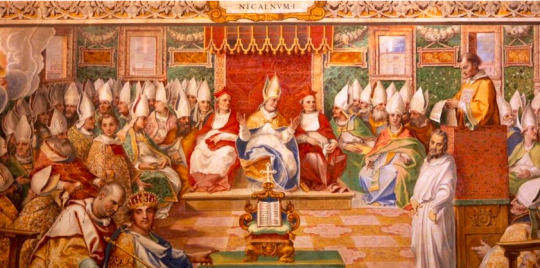
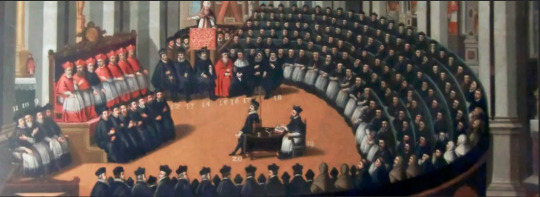
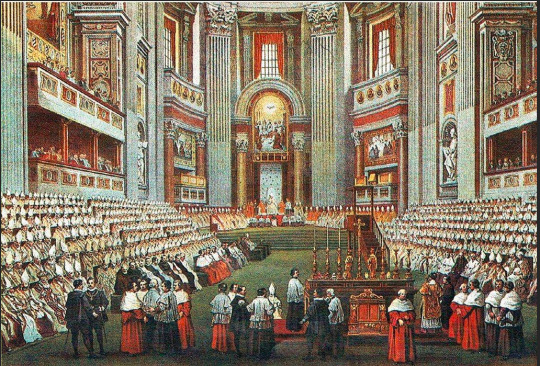
Images of the Council of Nicaea, Council of Trent, and First Vatican Council
[John Henry Newman] recognized Christ must have established an authority on earth to judge certain interpretations to be out of bounds; to look at the various competing interpretations and say, "These do not conform to the Tradition as we've received it." And the Catholic Church very rarely does that: we accommodate an awful lot of speculation. But there are certain times when the controversy provokes a crisis and begins to divide the Church, and it's then that the Church is duty-bound to come forward and to make a ruling, and to exercise the authority that it's always exercised[.]
#Christianity#Catholicism#Ecumenical Council#Sacred Tradition#Ecclesia#Council of Nicea#Council of Trent#Vatican I
37 notes
·
View notes
Note
Saw the recent post about Jesus’ humanity and the differences between Catholicism and other sects of Christianity, and just got curious. How do you wrestle with the idea of the Council of Nicea and other ecumenical councils determining doctrine? As a historian it’s just so foreign to me that individuals would get to determine the rules of a faith so openly!
Always love the content, thanks!
I love it. This way, everyone is on the same page. It’s not like they came up with it out of the blue, they looked at the Bible and discussed amongst themselves which is most theologically likely.
These small details matter. In these “small” details is where I think people get lost and begin believing heresies even proclaiming themselves devout Catholics. Its good to have structure and something to point to for the exact rules.
29 notes
·
View notes
Text
occasionally I think about those hard core right wing christans who say shit like 'Christ died for his own glory/himself' or 'Christ didn't actaully suffer on the Cross' and I feel like I'm oging fucking insane
#christanity#way to miss the point of your entire fucking religion assholes#every single person at the Council of Nicea would have turned and killed whoever uttered the phrase 'Christ died for himself'
16 notes
·
View notes
Text
When you gotta reset your tumblr password.
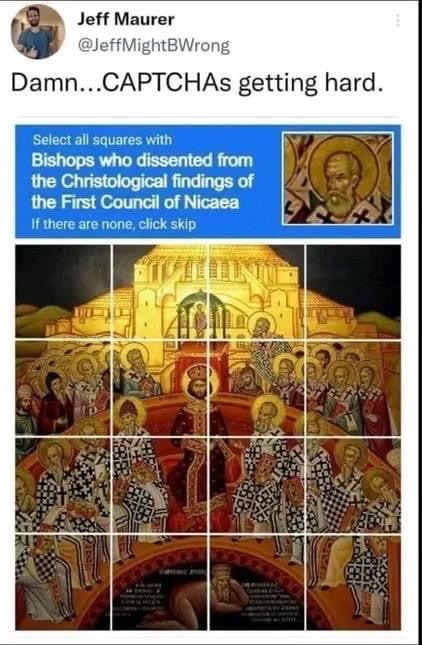
2 notes
·
View notes
